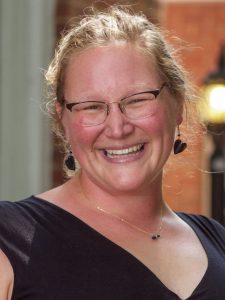
With family roots in Peru and in the United States, Lucía Isabel Stavig grew up traveling to visit family and spending time with Indigenous people in the Andes. When she found out how a dictator forced sterilization among hundreds of thousands of Indigenous women in the mid-1990s, she described feeling enraged by what she had learned.
“I had spent parts of my childhood with these women,” Stavig said. “It broke my heart, and I wanted to do something about it.”
That moment of recognition led her to conduct research in Peru by listening to women and the effects that the sterilization had on their lives, including issues of racism, sexism and those within the medical establishment in Peru.
“When one person is harmed, that harm radiates out into their community. But fortunately, so can healing. … They still love, they still laugh, they still have dreams. And I wanted to focus on that.”
As a Ph.D. student, Stavig traveled to Peru on multiple occasions — before the onset of the COVID-19 pandemic, which found her in her field site in rural Peru.
“The initial stages of COVID allowed me to see how interconnected rural communities are to the cities. …Usually, we see the city supporting the countryside. I was very humbled to see people sending sacks of hundreds of pounds of food to their families stuck in the city.”
Four months after the pandemic began, Stavig left Peru and returned to her home state of Florida. As she described, the effects of the pandemic and other issues affected her mental health and well-being and left her grasping for resources. Several months later, she found the care she needed at Counseling and Psychological Services.
“We talk about resources that we have for anxiety and depression, but we do not talk about what anxiety and depression feel like in your every day life,” Stavig said. “We need to listen to each other; we need to check in on one another; and most of all, we need to listen to our bodies.”
As part of the Royster Society of Fellows, Stavig said she’s been able to work with some of the most amazing minds of her generation.
“I’m constantly awed and humbled by their social commitment, their innovation, and their brilliance,” she said. “Having the Royster elevated my level of scholarship and my ability to engage wholeheartedly with people in Peru. It really has meant everything.”
She also connected with The Graduate School’s Initiative for Minority Excellence, part of its Diversity and Student Success Program.
“I felt lonely in many spaces,” she said. “But at IME, I could be all of myself. … I’m so grateful to those who walk through graduate school with us at IME.”
Following graduation, Stavig plans to continue advocacy work and to uplift the efforts of Indigenous women and communities so they can heal, in addition to continued research. At Carolina, her adviser was Florence Babb in the department of anthropology in the College of Arts & Sciences.
“I think that public education is really important, and I’m proud to be graduating from the country’s first public institution for higher education.”
By Elizabeth Poindexter, The Graduate School
